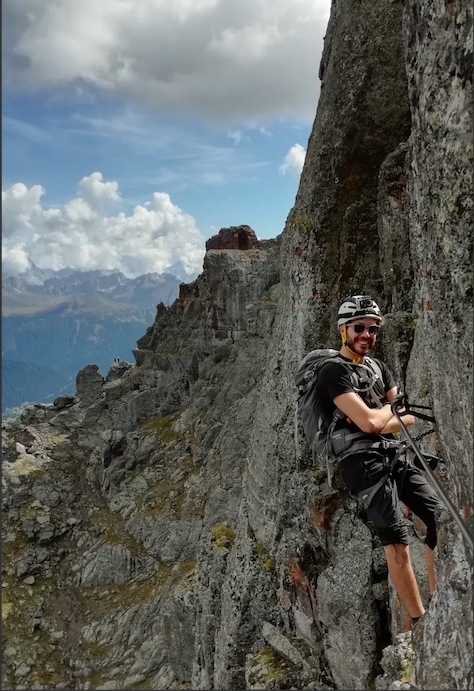Cosimo Marco Scarcelli (born in Trani, Italy, 1984) is professor of Sociology of Media at the University of Padova and University IUSVE of Venice, where he teaches and investigates digital media, gender, sexuality, young people and digital literacy. Cosimo Marco, but everyone calls him Marco, is chair of the Gender and Communication Section of ECREA and previously served as its vice-chair for four years.
What are your hobbies outside academia?
My three most important hobbies are photography, cycling and rock climbing. I started to take pictures when I was 18 years old, and I bought an analogue camera. For a while, I worked as a photographer, and I did some exhibitions. Now, it is just a hobby, but I like it! I also like to spend time (when I have it!) outside and stay in contact with nature, so I like to ride my gravel bike and go rock climbing.
How did you start rock climbing?
I started three years ago. I liked hiking, but I needed more adrenaline and an activity that permitted to me to focus on something cleansing, temporarily freeing the mind from everyday stress. So, I started with vie ferrate, and I liked it a lot, but it was not enough. I asked a friend to introduce me to rock climbing. I tried an artificial wall in Padova, and it was exciting, so I decided to take a rock-climbing course with a couple of friends. I learned the basic movements of climbing and overall how to ensure your safety with the wire and how to belay a lead climber—simple tips that are literally vital (for you and your partner) when you are climbing.
 What do you see as your greatest rock-climbing achievement?
What do you see as your greatest rock-climbing achievement?
At the moment, the most important achievement is the multipitch climb I did last spring with a couple of friends on mountains in the Friuli Venezia Giulia region called Via l’Estetista e il Biottico. More than 200 meters to climb and lots of emotions. From a psychological point of view, rock climbing teaches me the importance of trusting my climbing partner and doing your best to make sure that everything is ok when you are belaying a lead climber. If you have a good partner, she/he can help you if you fail, and sometimes, she/he can save your life. And you have to be ready to do the same.
Are there any similarities between academic work in Communication and rock climbing?
In academic work and climbing, it is necessary to do lots of work to improve your capabilities, and sometimes, it is frustrating because you have to work hard just to see small improvements. But when you reach your goals, you are full of energy and ready for a new adventure. You need to go higher and go outside your comfort zone because you need adrenaline.
In addition, a good climber has to combine competences from different fields: knowledge on bonds, different rocks, the environment (for example, how to read weather conditions), how to treat your partner/s to help her/him to fight her/his fear, etc. For an academic, working in communication is the same. She/he cannot stop at having knowledge about her/his specific field. She/he has to be an omnivore and take information, inspiration and knowledge from different fields and be able to combine them.
Do you check for rock-climbing sites when planning an academic trip? Have you ever combined the two?
Usually, I am curious, and when I plan an academic trip, I look for sites to climb. But, at the moment, I have never combined academic trips with rock climbing, but just because I do not know colleagues who like to climb.
Would you recommend your hobby/hobbies to other academics?
Of course! Because I am looking for academic climbers to spend some time with outside during academic trips. I think that rock climbing can be a great activity for academics because when you are on the rocks, you are focused on you, and you can forget the stressful academic life for a while. And then you can see great places and panoramas that recharge and inspire you.
Jelena Kleut